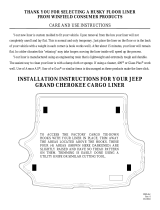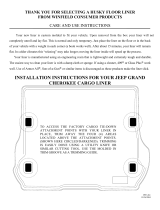Page 2 of 20
While installation is being performed, check for signs of
damage or excessive corrosion. Do not install hitch
components over vehicle parts that are broken or have
compromised structural integrity.
Adding Stealth hitch components to the chassis of any
vehicle can be hazardous. There is potential for
unexpected combustion of fuel, electric shock, burns,
shifting or falling of unstable vehicle, damage to vehicle,
injury from tool usage and many other hazards. This
installation must be completed by someone who is
aware of the hazards involved. This person must be
knowledgeable of proper safety procedures for a
vehicle modification of this nature, and for usage of the
equipment required to perform the installation.
Without proper knowledge, towing can be a dangerous
activity. Understand all the risks involved with towing
before proceeding. For information on towing safety,
see "The Trailer Handbook: A Guide to
Understanding Trailer and Towing Safety" from the
National Association of Trailer Manufacturers,
www.NATM.com and your trailer and tow vehicle
manufacturer's owner's manual.
Do not exceed tow or tongue rating of coupler, tow or
tongue rating of hitch, or tow or weight ratings of tow
vehicle or trailer. See vehicle and trailer manufacturer
information for ratings. Exceeding these ratings may
cause damage to towing components or loss of
attachment between the trailer and vehicle.
Do not modify this product in any manner. Doing so
could alter its integrity and lead to a loss of attachment
between the trailer and the tow vehicle.
This product was designed to fit vehicles in their
original, "as manufactured" condition. Compatibility
with vehicles having replacement parts, or other
modifications is not guaranteed. Inspect vehicle for
modifications before installation of this product.
Some accessories, like the rack receiver, are not rated
for towing. Do not use any accessories without proper
knowledge of their use.
A visual inspection of the hitch should be performed
before each use. Regularly check that all connections
are secure, including those that secure the hitch to the
vehicle. Check for cracks or damage to the hitch. Do not
use the hitch if cracks or damage outside of normal
wear is found. Using a hitch that has unsecure
connections and/or cracks or damage could result in
damage to the tow vehicle, trailer, towing components
and loss of attachment between the tow vehicle and
trailer.
Failure to comply with the safety information in these
instructions could result in serious injury or death.
<THESE INSTRUCTIONS MUST BE GIVEN TO THE END USER>
IMPORTANT SAFETY NOTICE FOR STEALTH HITCH INSTALLERS AND CUSTOMERS.
Read all installation and operating instructions along with all labels before installing or using this product. Do not perform
any installation or towing procedures without fully understanding the correct tools and actions for all steps. Call for
support if needed.
Stealth hitches are not compatible with any weight
distribution or sway control products. Adding additional
products to the trailer or chassis which modifies the
function of the Stealth hitch may cause hitch failure.
INSTALLATION NOTE: In most instances, these instructions will only outline disassembly of vehicle components.
Re-installation of components will require the installer to retain vehicle hardware and work through disassembly
instructions in reverse order. When installation is complete, double check that all vehicle components have been replaced
and are secured.
NOTICE: Installation of Stealth products may or may not require the addition of a wiring harness to the vehicle.
• The Rack Receiver only product does not require adding a wiring harness.
• The Rack Receiver plus Tow Kit requires the addition of a “Passive” wiring harness to the vehicle. The passive harness
“reads” the output of the vehicle’s lights and translates the signals to the trailer without being connected to the vehicle
computer.
























